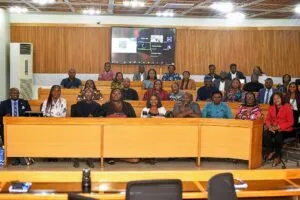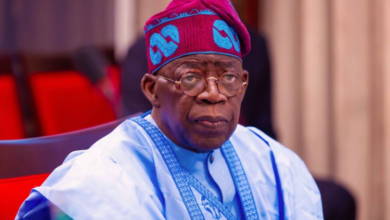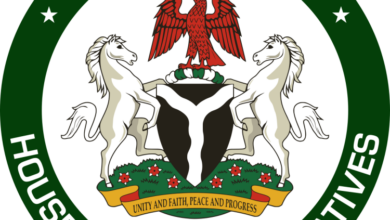ESG Reporting: LBS Sustainability Centre Educates Business Executives on Changing Reporting Landscape

The Lagos Business School (LBS) Sustainability Centre has continued to educate professionals from Corporate Organisations, institutions and individuals on the Environmental, Social and Governance (ESG) reporting, stating that exciting investor and stakeholder engagement opportunities await organisations and professionals keen on leveraging the sustainability performance of businesses.
This is more imperative as calls for increased transparency in performance and impact measurement heightened, leading to Nigeria’s adoption of the IFRS Sustainability Disclosure Standards, IFRS S1 and S2.
In practical demonstration of its mandate to provide first-class solution-driven trainings for professionals on various business areas to enhance their capabilities and performance, the Centre on Thursday, February 1, 2024 hosted an Executive Meeting on Corporate Sustainability themed “Collaborating in the Changing Reporting Landscape’.”
The engagement was aimed at helping business executives and sustainability practitioners to understand the demands of this changing landscape, collaborate for more robust reporting, deploy responsible business practices and avoid greenwashing.
Speaking at the meeting, Dr Iheanyi Anyahara, Director, Financial Reporting Council of Nigeria, walked attendees through the evolution of sustainability reporting in Nigeria and the globe, citing the needs that prompted it in the first instance.
He said, “the Corporate Social Responsibility (CSR) reports put together by companies were never standardised, hence, the need for standardised Environmental, Social and Governance (ESG) reporting.
He further added that sustainability brings about innovation which in turn accelerates development, noting that “Little wonder, investors and stakeholders rely on accurate and transparent sustainability reporting to unlock capital, attract Foreign Direct Investment (FDI) and implement FEC 2010 directives.”
Marilyn Obaisa-Osula, Associate Director, PwC Nigeria; gave sustainability insights for organisations and individuals who seek to get it right by ticking the right boxes for performance measurement of impact across critical materialities and metrics.
She said, “the aim of sustainability is to drive value. Sustainability reporting offers a genuine competitive advantage, and businesses that take the time to learn about and implement sustainability reporting now, will be well-placed to succeed in the long term ahead of compliance and regulations. We must look at the opportunities sustainability provides through a local lens, and oftentimes, when we do, they become adopted as globally accepted frameworks.”
She added that “Sustainability does not wipe out profit but tells you to look at your business growth beyond profit. Accountants now see sustainability and understand it because they see the opportunity in it and the funds that can be unlocked from it.”
A Question and Answer session was facilitated by Eunice Sampson, Director, Climate Change & Sustainability at Ernst & Young; who made the session truly impactful.
She harped on the need for practitioners to stay ahead of regulation by being up to date with new requirements and trends in the industry to keep their organisations afloat.
She said “ Businesses mostly fail not because of financial issues but because of ESG issues. They lose reputational capital, they lose customer base, and many other things, etc which ultimately lead to business failure. Financial failure is a symptom. Ethics, integrity, accountability and transparency are all governance issues in sustainability.”
She added that “You must have your business case for sustainability.”
Dr Godwin Ihetu, former Managing Director (MD), Nigeria Liquefied Natural Gas (NLNG) also gave his remarks, highlighting the importance of sustainability in the oil and gas sector, and its intersection and interconnectedness with climate change and energy transitions.
Jonathan Ikeolumba, Research Affiliate at the LBS Sustainability Centre compered the event and Theresa Akpoveso, Senior Associate, LBS Sustainability Centre gave the vote of thanks.
Lagos Business School is Africa’s leading management education institution and the LBS Sustainability Centre is a leading knowledge centre that brings together the theory and practice on business and sustainability for the advancement of performance and development outcomes.
For more information about the initiatives and upcoming events by the Lagos Business School Sustainability Centre, please contact sustainabilitycentre@lbs.edu.ng. Together we can work towards a sustainable future for businesses on the continent. See our programmes at https://lbssustainabilitycentre.edu.ng/training





